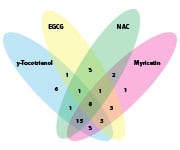Newly Discovered Longevity Benefits of Mediterranean Diet
April 2017
 By Michael Campbell
A study published in the New England Journal of Medicine showed that following a Mediterranean diet contributed to a 30% reduction in the combined risk of acute heart attack, stroke, or cardiovascular death.1
This study further validates that a Mediterranean diet is an effective health intervention capable of significantly lowering cardiovascular disease risk.
While it is now clear that following a Mediterranean diet leads to cardiovascular benefits, researchers continue to examine how the diet provides such strong protection.
New studies reveal that the high content of polyphenols found in the foods that comprise the Mediterranean diet is a key factor in its ability to reduce the risk of dying.2-4
The beneficial impact of a healthy diet on human physiology remains grossly underappreciated.
Virtually every degenerative disease can be favorably influenced by dietary intervention. Yet modern medicine relies almost exclusively on prescription drugs to treat chronic illnesses.
The challenge is that many people feel “addicted” to food groups that are highly toxic. The good news is that following a lifesaving Mediterranean diet does not require deprivation of delicious foods, and the healthy polyphenols can be obtained in dietary supplements.
In a recent study presented at the European Society of Cardiology Congress 2016, researchers looked at survival rates of cardiovascular disease patients who followed a Mediterranean-style diet.
The study tracked 1,197 people over seven years. It found that those who most closely followed a Mediterranean diet died 37% less often than those with the least compliance with the diet.5
A separate analysis of 92 studies involving about 200,000 people found that statin (cholesterol-lowering) drugs reduce the risk of death by 18% in those with cardiovascular disease.6
Although these are not directly comparable studies, they nevertheless suggest that a healthier diet is more effective in keeping those with pre-existing cardiovascular disease alive.
These findings were presented at the world’s largest conference on cardiovascular disease. Scientists at this conference hailed the new findings as “extraordinary,” showing that adhering to a Mediterranean diet is “more powerful than any drug.”7
This is not the first report showing reductions in mortality in those who follow a Mediterranean-style diet. Food/drinks that comprise this diet provide plant polyphenols along with olive oil and omega-3s, all of which have been shown to confer longevity.
Another feature of a Mediterranean-style diet is that it’s low in foods that are harmful, such as meats. A growing body of data implicates heavy meat eating with a host of degenerative illnesses such as Alzheimer’s dementia and chronic kidney disease.8
By Michael Campbell
A study published in the New England Journal of Medicine showed that following a Mediterranean diet contributed to a 30% reduction in the combined risk of acute heart attack, stroke, or cardiovascular death.1
This study further validates that a Mediterranean diet is an effective health intervention capable of significantly lowering cardiovascular disease risk.
While it is now clear that following a Mediterranean diet leads to cardiovascular benefits, researchers continue to examine how the diet provides such strong protection.
New studies reveal that the high content of polyphenols found in the foods that comprise the Mediterranean diet is a key factor in its ability to reduce the risk of dying.2-4
The beneficial impact of a healthy diet on human physiology remains grossly underappreciated.
Virtually every degenerative disease can be favorably influenced by dietary intervention. Yet modern medicine relies almost exclusively on prescription drugs to treat chronic illnesses.
The challenge is that many people feel “addicted” to food groups that are highly toxic. The good news is that following a lifesaving Mediterranean diet does not require deprivation of delicious foods, and the healthy polyphenols can be obtained in dietary supplements.
In a recent study presented at the European Society of Cardiology Congress 2016, researchers looked at survival rates of cardiovascular disease patients who followed a Mediterranean-style diet.
The study tracked 1,197 people over seven years. It found that those who most closely followed a Mediterranean diet died 37% less often than those with the least compliance with the diet.5
A separate analysis of 92 studies involving about 200,000 people found that statin (cholesterol-lowering) drugs reduce the risk of death by 18% in those with cardiovascular disease.6
Although these are not directly comparable studies, they nevertheless suggest that a healthier diet is more effective in keeping those with pre-existing cardiovascular disease alive.
These findings were presented at the world’s largest conference on cardiovascular disease. Scientists at this conference hailed the new findings as “extraordinary,” showing that adhering to a Mediterranean diet is “more powerful than any drug.”7
This is not the first report showing reductions in mortality in those who follow a Mediterranean-style diet. Food/drinks that comprise this diet provide plant polyphenols along with olive oil and omega-3s, all of which have been shown to confer longevity.
Another feature of a Mediterranean-style diet is that it’s low in foods that are harmful, such as meats. A growing body of data implicates heavy meat eating with a host of degenerative illnesses such as Alzheimer’s dementia and chronic kidney disease.8
April 2017

By Michael Campbell
A study published in the New England Journal of Medicine showed that following a Mediterranean diet contributed to a 30% reduction in the combined risk of acute heart attack, stroke, or cardiovascular death.1
This study further validates that a Mediterranean diet is an effective health intervention capable of significantly lowering cardiovascular disease risk.
While it is now clear that following a Mediterranean diet leads to cardiovascular benefits, researchers continue to examine how the diet provides such strong protection.
New studies reveal that the high content of polyphenols found in the foods that comprise the Mediterranean diet is a key factor in its ability to reduce the risk of dying.2-4
The beneficial impact of a healthy diet on human physiology remains grossly underappreciated.
Virtually every degenerative disease can be favorably influenced by dietary intervention. Yet modern medicine relies almost exclusively on prescription drugs to treat chronic illnesses.
The challenge is that many people feel “addicted” to food groups that are highly toxic. The good news is that following a lifesaving Mediterranean diet does not require deprivation of delicious foods, and the healthy polyphenols can be obtained in dietary supplements.
In a recent study presented at the European Society of Cardiology Congress 2016, researchers looked at survival rates of cardiovascular disease patients who followed a Mediterranean-style diet.
The study tracked 1,197 people over seven years. It found that those who most closely followed a Mediterranean diet died 37% less often than those with the least compliance with the diet.5
A separate analysis of 92 studies involving about 200,000 people found that statin (cholesterol-lowering) drugs reduce the risk of death by 18% in those with cardiovascular disease.6
Although these are not directly comparable studies, they nevertheless suggest that a healthier diet is more effective in keeping those with pre-existing cardiovascular disease alive.
These findings were presented at the world’s largest conference on cardiovascular disease. Scientists at this conference hailed the new findings as “extraordinary,” showing that adhering to a Mediterranean diet is “more powerful than any drug.”7
This is not the first report showing reductions in mortality in those who follow a Mediterranean-style diet. Food/drinks that comprise this diet provide plant polyphenols along with olive oil and omega-3s, all of which have been shown to confer longevity.
Another feature of a Mediterranean-style diet is that it’s low in foods that are harmful, such as meats. A growing body of data implicates heavy meat eating with a host of degenerative illnesses such as Alzheimer’s dementia and chronic kidney disease.8
Proving Cardiovascular Benefits of Mediterranean Diet
 A study published in the New England Journal of Medicine utilized the preferential full, randomized, controlled study design.1
Called PREDIMED (PREvención con DIeta MEDiterránea), the study involved 7,447 women (aged 60 to 80) and men (aged 55 to 80) who were at a high cardiovascular risk but did not have cardiovascular disease when they enrolled in the study.
Subjects were randomly assigned to one of three groups:
A study published in the New England Journal of Medicine utilized the preferential full, randomized, controlled study design.1
Called PREDIMED (PREvención con DIeta MEDiterránea), the study involved 7,447 women (aged 60 to 80) and men (aged 55 to 80) who were at a high cardiovascular risk but did not have cardiovascular disease when they enrolled in the study.
Subjects were randomly assigned to one of three groups:
- Mediterranean diet plus 4 tablespoons of extra virgin olive oil daily
- Mediterranean diet plus one ounce of nuts daily
- Control diet
By the end of the study, both Mediterranean diet groups experienced a significant 30% reduction in the combined risk of acute heart attack, stroke, or cardiovascular death over the five-year period, compared with the control group.
What is compelling about these findings is that the people in the Mediterranean diet groups had fewer dietary restrictions compared with the control group, and none of the groups restricted their caloric intake or boosted their exercise at all.
More importantly, this study validated the Mediterranean diet as a true health intervention that can significantly lower cardiovascular disease risk.
This is a radical advance over many previous studies, which could only show correlation between diet and heart disease risk.

A study published in the New England Journal of Medicine utilized the preferential full, randomized, controlled study design.1
Called PREDIMED (PREvención con DIeta MEDiterránea), the study involved 7,447 women (aged 60 to 80) and men (aged 55 to 80) who were at a high cardiovascular risk but did not have cardiovascular disease when they enrolled in the study.
Subjects were randomly assigned to one of three groups:
- Mediterranean diet plus 4 tablespoons of extra virgin olive oil daily
- Mediterranean diet plus one ounce of nuts daily
- Control diet
By the end of the study, both Mediterranean diet groups experienced a significant 30% reduction in the combined risk of acute heart attack, stroke, or cardiovascular death over the five-year period, compared with the control group.
What is compelling about these findings is that the people in the Mediterranean diet groups had fewer dietary restrictions compared with the control group, and none of the groups restricted their caloric intake or boosted their exercise at all.
More importantly, this study validated the Mediterranean diet as a true health intervention that can significantly lower cardiovascular disease risk.
This is a radical advance over many previous studies, which could only show correlation between diet and heart disease risk.
FOR COMPLETE ARTICLE AND MORE INFO, CLICK HERE.
Geroprotectors
Next Frontier in Fight Against Aging
April 2017
 By Scott Kreshin
As longevity scientists look to target and stop aging, many researchers are focusing on geroprotectors, compounds capable of preventing or even reversing aging at the cellular level.
Senescent cells are particularly troublesome when they enter the stage in which they can no longer properly divide and function. As cells become dysfunctional, organ health markedly deteriorates.
Another problem caused by cell senescence is release of proinflammatory cytokines that systemically damage tissues.
Compounds capable of identifying and eliminating senescent cells are categorized as senolytics.
Clinical research on geroprotectors and senolytics is complicated by the fact that many decades of time may be required to determine human longevity benefits.
A novel way to accelerate the research is via the strategic use of high-speed computer programs employing artificial intelligence biomedical algorithms. This technology has advanced to where it can identify natural compounds that activate anti-aging pathways throughout the body.
Seeing the enormous potential of this kind of deep-learning artificial intelligence, Life Extension® has partnered with Insilico Medicine to identify nutrient cocktails that function as geroprotectors. The objective is to develop better ways to potentially slow or even stop certain aspects of aging processes.
This scientific collaboration has resulted in the identification of a geroprotector formulation consisting of four nutrients with various complementary and reinforcing properties. These include effects on cell signaling pathways with the potential to prevent the degenerative progression of damaged cells to a senescent state—and eliminate those that have reached irreversible senescence.1,2
With the discovery of geroprotective compounds, there are now greater opportunities to more effectively intervene into cellular aging processes.
By harnessing artificial intelligence advances with existing scientific data, a powerful new weapon to combat degenerative aging has emerged.
By Scott Kreshin
As longevity scientists look to target and stop aging, many researchers are focusing on geroprotectors, compounds capable of preventing or even reversing aging at the cellular level.
Senescent cells are particularly troublesome when they enter the stage in which they can no longer properly divide and function. As cells become dysfunctional, organ health markedly deteriorates.
Another problem caused by cell senescence is release of proinflammatory cytokines that systemically damage tissues.
Compounds capable of identifying and eliminating senescent cells are categorized as senolytics.
Clinical research on geroprotectors and senolytics is complicated by the fact that many decades of time may be required to determine human longevity benefits.
A novel way to accelerate the research is via the strategic use of high-speed computer programs employing artificial intelligence biomedical algorithms. This technology has advanced to where it can identify natural compounds that activate anti-aging pathways throughout the body.
Seeing the enormous potential of this kind of deep-learning artificial intelligence, Life Extension® has partnered with Insilico Medicine to identify nutrient cocktails that function as geroprotectors. The objective is to develop better ways to potentially slow or even stop certain aspects of aging processes.
This scientific collaboration has resulted in the identification of a geroprotector formulation consisting of four nutrients with various complementary and reinforcing properties. These include effects on cell signaling pathways with the potential to prevent the degenerative progression of damaged cells to a senescent state—and eliminate those that have reached irreversible senescence.1,2
With the discovery of geroprotective compounds, there are now greater opportunities to more effectively intervene into cellular aging processes.
By harnessing artificial intelligence advances with existing scientific data, a powerful new weapon to combat degenerative aging has emerged.
April 2017

By Scott Kreshin
As longevity scientists look to target and stop aging, many researchers are focusing on geroprotectors, compounds capable of preventing or even reversing aging at the cellular level.
Senescent cells are particularly troublesome when they enter the stage in which they can no longer properly divide and function. As cells become dysfunctional, organ health markedly deteriorates.
Another problem caused by cell senescence is release of proinflammatory cytokines that systemically damage tissues.
Compounds capable of identifying and eliminating senescent cells are categorized as senolytics.
Clinical research on geroprotectors and senolytics is complicated by the fact that many decades of time may be required to determine human longevity benefits.
A novel way to accelerate the research is via the strategic use of high-speed computer programs employing artificial intelligence biomedical algorithms. This technology has advanced to where it can identify natural compounds that activate anti-aging pathways throughout the body.
Seeing the enormous potential of this kind of deep-learning artificial intelligence, Life Extension® has partnered with Insilico Medicine to identify nutrient cocktails that function as geroprotectors. The objective is to develop better ways to potentially slow or even stop certain aspects of aging processes.
This scientific collaboration has resulted in the identification of a geroprotector formulation consisting of four nutrients with various complementary and reinforcing properties. These include effects on cell signaling pathways with the potential to prevent the degenerative progression of damaged cells to a senescent state—and eliminate those that have reached irreversible senescence.1,2
With the discovery of geroprotective compounds, there are now greater opportunities to more effectively intervene into cellular aging processes.
By harnessing artificial intelligence advances with existing scientific data, a powerful new weapon to combat degenerative aging has emerged.
Using Artificial Intelligence to Solve Aging

Overlap and Unique Pathway
Activation - Figure 1.
The numerals within the diagram
indicate the number of pathways
activated by the four short-
listed nutrients.
Life Extension and Insilico Medicine researchers ran computer simulations of more than 200 potential geroprotective compounds and narrowed the list down to four.1,2 While most of these candidates were known natural nutrients, their full potential as geroprotectors remained elusive.
Scientists found that all four of these nutrients work together, but in very different ways, to beneficially influence key anti-aging pathways. Together, they combat numerous aging factors throughout the body.
These compounds all modulate specific biological pathways responsible for keeping us young and healthy.
When combined, these ingredients promote anti-aging mechanisms at the cellular level throughout the body, acting by multiple pathways, some unique, and some overlapping.
Together, these four natural compounds represent the beginning of the future: anti-aging cocktails identified using artificial intelligence under expert human supervision.

Overlap and Unique Pathway
Activation - Figure 1.
The numerals within the diagram
indicate the number of pathways
activated by the four short-
listed nutrients.
Activation - Figure 1.
The numerals within the diagram
indicate the number of pathways
activated by the four short-
listed nutrients.
Life Extension and Insilico Medicine researchers ran computer simulations of more than 200 potential geroprotective compounds and narrowed the list down to four.1,2 While most of these candidates were known natural nutrients, their full potential as geroprotectors remained elusive.
Scientists found that all four of these nutrients work together, but in very different ways, to beneficially influence key anti-aging pathways. Together, they combat numerous aging factors throughout the body.
These compounds all modulate specific biological pathways responsible for keeping us young and healthy.
When combined, these ingredients promote anti-aging mechanisms at the cellular level throughout the body, acting by multiple pathways, some unique, and some overlapping.
Together, these four natural compounds represent the beginning of the future: anti-aging cocktails identified using artificial intelligence under expert human supervision.
Boosting Glutathione May Reduce Age-Related
Diseases... Improve Family Health With NAC
April 2017
 |
Aging causes a decline in glutathione that leaves people more susceptible to common health problems.
New research shows N-acetyl-cysteine could be effective in helping maintain healthy levels of glutathione.*
High doses of N-acetyl-cysteine (NAC) are often used in medical emergencies to detoxify patients who have ingested poisonous substances. Researchers believe NAC could also be used at low doses to block the age-related loss of glutathione, which fights commonly encountered toxins.
As it relates to detoxification, insufficient glutathione is linked to common causes of death: cancer, diabetes, and cardiovascular disease.
Tory Hagen, lead researcher of the study conducted at Oregon State University, commented, “We’ve known for some time of the importance of glutathione as a strong antioxidant. What this study pointed out was the way cells from younger animals are far more resistant to stress than older animals. In young animal cells, stress doesn’t cause such a rapid loss of glutathione. The cells from older animals, on the other hand, were quickly depleted of glutathione and died twice as fast when subjected to stress.”
The study found that pre-treatment with NAC raised glutathione in older cells and helped offset cell death.
GET THE "Powerful Antioxidant for Liver & Immune Health"... NAC 
Editor’s Note: “I’m optimistic there could be a role for this compound in preventing the increased toxicity we face with aging, as our abilities to deal with toxins decline,” Hagen elaborated. “We might be able to improve the metabolic resilience that we’re naturally losing with age.”
Latest Vitamin D Research Suggests Lifespan Link and More... to Family Health
 |
In an investigation published in Cell Reports, a team from the Buck Institute found that vitamin D extended median lifespan in the roundworm C. elegans by a third and helped support protein homeostasis, the ability of proteins to maintain shape and function.*
“Vitamin D3 reduced the age-dependent formation of insoluble proteins across a wide range of predicted functions and cellular compartments, supporting our hypothesis that decreasing protein insolubility can prolong lifespan,” reported research team leader Karla Mark, PhD.
“Vitamin D engaged with known longevity genes. It extended median lifespan by 33% and slowed the aging-related misfolding of hundreds of proteins in the worm,” explained senior author Gordon Lithgow, PhD.
GET THE "Broad-Spectrum Health Benefits"... VITAMIN D HERE
FHF
PREFERRED AFFILIATE SITES:

No comments:
Post a Comment